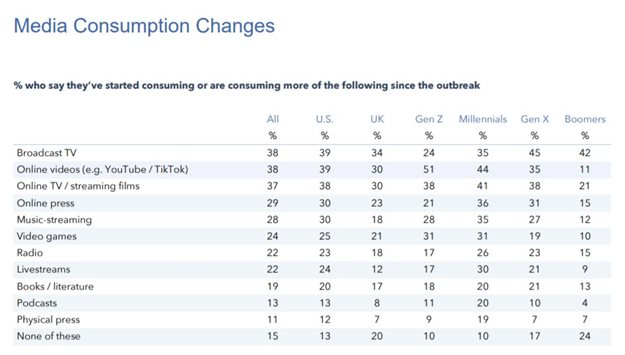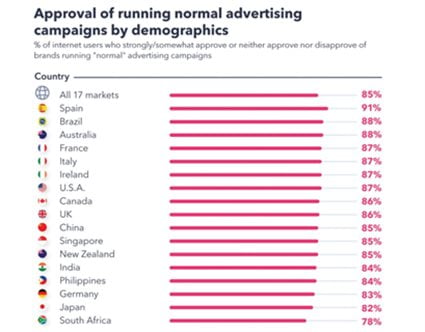
Top stories






More news


Marketing & Media
Ads are coming to AI. Does that really have to be such a bad thing?














Many of us grew up on magazine titles such as Cosmopolitan and House & Leisure - they were like a home-cooked meal by your mom - dependable and always there.
Sadly, the Covid-19 crisis proved the last straw for these media leaders. The Mail & Guardian reported that even before the pandemic, the Reuters Institute for Journalism’s 2019 report into digital media described the future for South Africa’s media as “grim” because of low online revenue and plummeting advertising.
While advertising spend is set to decrease significantly both locally and globally in 2020, there may be a glimmer of hope among the chaos. This is particularly significant, given advertising’s role in driving consumer demand for products and services which in turn impacts employment and our economy.
For almost every company, Covid-19 has forced exec teams to bring budgets front and centre. According to the IAB’s report, the knee-jerk reaction during Covid-19 has been to cut US marketing spend or least delay spend until the second half of the year.
Interestingly we’ve seen companies (valiantly) fighting that urge. Brands have moved their media spend to where the people are - at home. What’s at home? Phones, laptops and Broadcast TV. The digital revolution was already at the boil, but it’s ready for serving now.
You can see this mirrored in IAB’s report. It shows that both digital and traditional media both took a hit at the start of the Covid-19 outbreak with digital media declining 33% and traditional media seeing a 39% decline. However, digital spend has started to recover increasing by 4% within the month while traditional media spend has declined even further to -44%. The fact that there are fewer cars on the roads and zero sporting events means fewer eyeballs on billboards, contributing to this decrease.
The upward recovery trend in digital spend mirrors the increase in digital users, which according to globalwebindex report, has resulted in a significant global increase in social media engagement since the Covid-19 pandemic.
Figures in South Africa show our country is home to 36.54 million internet users with a national internet penetration rate of 62%. The rate, reported in January this year, is 3.1% up since last year, according to the 2020 report conducted by social media management platform Hootsuite and We Are Social.
According to globalwebindex’s Coronavirus Media Consumption & Sport report, around a third of consumers across the US and UK want to see more topics unrelated to the coronavirus, showing the importance of bringing in a sense of escapism or normality as the outbreak consumes every aspect of our daily life. Among those seeking more non-coronavirus news, around 70% are looking for positivity in the news they consume.

These stats are mirrored in our own data. Since the outbreak, I’ve seen unique visits to my online parenting platform, BabyYumYum increase by 64%, social media engagement is up by 26% and we’ve seen subscriptions grow by 13%. BabyYumYum’s media partners spend has increased by 30% spend as brands search for a strong digital presence with which to affiliate themselves.”
The globalwebindex report shows that in South Africa, 78% of consumers want to see advertising and media to continue as ‘normal’, while the population continues to trust reputable resources for news and information.
People still need information to conduct their lives. On BabyYumYum I’ve seen an increased demand for our parenting lifestyle and child-related content. People are still having babies (there may be way more in oh, say 8 to 9 months. Just a hunch :), people are still family planning.
Now more than ever, new parents are looking for resources with which they can deeply connect. Media is still thriving - it just depends on where audiences are thriving.
This is an important time for brands to communicate with their audiences and send strong messages of support. BabyYumYum parents are wanting to engage with brands providing practical information and tips to empower them in dealing with the situation.

Brands will have to pivot to stay relevant, think innovatively and ‘go digital’. Even within our own digital platform, we’ve had to quickly pivot to cater to parents’ needs in a new world, ensuring our audience still felt part of our close-knit community. To this end, we launched a podcast series as well as live Instagram videos.
We made community interaction a top priority, enabling our audience to engage with brands and also share their own content, helping our parenting community to feel close to one another despite social-distancing realities.
For brands, digital advertising has always been more cost-effective than traditional media. With much lower CPA (cost per acquisition) rates, and a colossal audience that’s easy to find and target, that’s the silver lining for brands even in times of crisis. It’s a big online world out there. Everyone is watching. Everyone is in the room. Are you?
